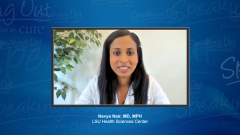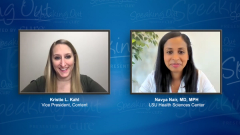
Discussing the Importance of Genetic Counseling in Women’s Cancer
As part of its Speaking Out video series, CURE spoke with Dr. Navya Nair, on behalf of the Foundation for Women’s Cancer, about genetics in women’s cancer.
Kristie L. Kahl: Looking back, how far have we come in the understanding of genetics in gynecologic cancer.
Dr. Navya Nair: We've come miles and miles and it's you know, taking a moment to reflect back is important to understand how far we've come. So if we just take a moment and think back, BRCA, or the BRCA gene was only discovered in the 1990s. And now, only about what 20 to 30 years later, we've made significant strides in understanding the genetics of gynecologic cancers, and also in developing targeted treatments that work for these cancers.
Kahl: Absolutely. And so earlier, we talked about access to care. What kind of gaps in access to genetic testing are we seeing? And if so, what are they?
Nair: So one of the biggest problems that we have is that there's just a limited number of genetic counselors, all over the country. So getting in to see one can be can be really tough. For many oncologists, you know, to mitigate that many oncologists are doing their own genetic counseling and testing, just so that the patient gets the care that they need. For some people, there's sometimes insurance barriers, but the companies that do genetic testing have gotten better and better, and testing has become much cheaper than it used to be even 10 years ago. So it's much more accessible to all patients.
Kahl: Absolutely. And so I'm happy you just brought up costs, because we hear a lot about these home tests now. But the verdicts not out yet on them. So can you discuss the at home testing and maybe why people should still make sure they're seeing a genetic counselor?
Nair: Yes, definitely, at home testing is widely accessible. And you know, you get it with a click of a button. But just as important as testing is the counseling, and that is not there for when you do the at home test so what's important in genetic counseling is that you understand what the test is actually being done, what your results may be, and how that may affect your life moving forward. Like what if you got a diagnosis of a hereditary cancer syndrome? What does that mean for your risk of getting X, Y, and Z cancer? And also, does this affect your ability to get life insurance, disability insurance in the future? These are all the things that go into genetic counseling, that are really important for everyone to understand before you get a test done. So I really caution people who get testing done without counseling, because that’s an important piece of the picture.
Kahl: Who should be getting genetic testing? And why is it important for these individuals to make sure that they go see at least go see a genetic counselor?
Nair: So let's just break it down to some basics. So there are certain genetic mutations that can lead to hereditary cancers. One of the most well-known ones and talked about ones is BRCA. But there are many other important ones. If someone gets diagnosed with one of these genetic mutations, they can be at risk for developing not just one but multiple cancers in their lifetime as well as having a risk of passing that on to their children. In the world of gynecologic cancers, all patients with ovarian cancer and when I say ovarian cancer, I mean, ovarian, fallopian tube and primary care to cancers should undergo genetic counseling and testing because they have up to a quarter risk of having a hereditary cancer syndrome. Certain young patients young meaning less than 50 years old with endometrial cancer should get genetic counseling and testing. Some patients who've had more than one cancer or have had one cancer and have had a strong family history of cancer may also warrant genetic counseling and testing. And then, you know, important to know is if you do get diagnosed with one of these hereditary cancer syndromes, there's a lot that can be done to prevent you from ever getting a cancer. So, heightened screening, risk reducing surgery can prevent subsequent cancer diagnosis. And for us, oncologists, that's always the best kind of cancer is the one that never happens.
Kahl: To bring it all together, what is your biggest piece of advice for maybe somebody who thinks they might be able to genetic risk for gynecologic cancer and, you know, maybe the next steps?
Nair: So I encourage patients who are worried about that or think they may be at a heightened risk to speak to their doctor, whether that's their primary care doctor, their OBGYN, or if they're a cancer patient or oncologist, and have a real honest conversation and if warranted, you know, maybe even meeting with a genetic counselor to talk about their risks, and then actually getting the testing if appropriate.
Transcription edited for clarity and conciseness.






